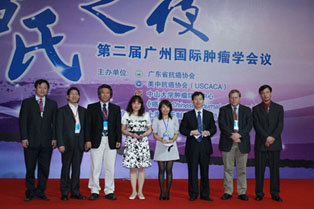The 2nd Guangzhou International Symposium on Oncology
Submitted by admin on Wed, 07/06/2011 - 02:43
Cancer is becoming a top killer in China following the trends that
have not been reversed in developed countries. Therefore, the war against
cancer that was initially declared in the US has also become a global war
that requires alliance of world-wide cancer researchers. As part of this
effort, The 2nd Guangzhou International Symposium on Oncology was
held on May 20-22 in Guangzhou, China. The conference was jointly
organized by the Guangdong Anti-Cancer Association, the US Chinese
Anti-Cancer Association, the Chinese Journal of Cancer, and the Sun Yat-
sen University Cancer Center. The USCACA president, Prof. Wei Zhang
of MD Anderson Cancer Center (MDACC), co-chaired of the conference
together with Dr. Yi-Xin Zeng, the President of Sun Yat-sen University
Cancer Center.
More than 800 cancer researchers attended the conference including
speakers from China, US, Finland, England, Japan, Australia, and
Singapore. There was a large presence of USCACA members at the
conference. The gathering of two days included many presentations that
covered most cancer types in the areas of basic research and therapeutics.
Dr. Wei Zhang began the conference with the first talk on cancer genome
atlas projects. USCACA managing director Dr. Li Yan of Merck Research
Laboratory, gave a presentation on clinical cancer drug development.
USCACA executive member,Prof. Dongfeng Tan of MDACC discussed
molecular testing and personalized cancer therapy.
At the welcome dinner attended by over 500 attendees, USCACA held the award ceremony where Drs. Wei Zhang and Li Yan, together with Dr. Pascal Qian of Pfizer representing USCACA China, presented the USCACA-NFCR (http://www.nfcr.org/) Scholarship awards to three outstanding young Chinese cancer researchers. Dr. Webster Cavenee, a Fellow of NFCR, represented NFCR at the award ceremony.
A recurring theme of the presentations is that cancer is smart, cancer
is complex, and cancer cells communicate actively. Outsmarting cancer
is clearly a challenging task that needs multipronged attacks on multiple
targets/hallmarks of cancer and on the communication systems among
malignant cells. Presenters and attendees left the conference with a
sense of urgency for more communications among cancer researchers
in our attempt to outsmart cancer. One of the emerging forums for the
communications is the Chinese Journal of Cancer (http://www.cjcsysu.cn/),
which has become an official journal of USCACA.
Source::
Internet

